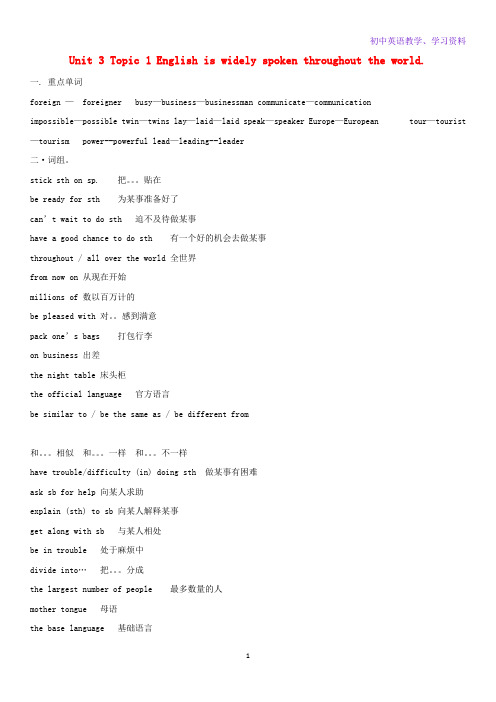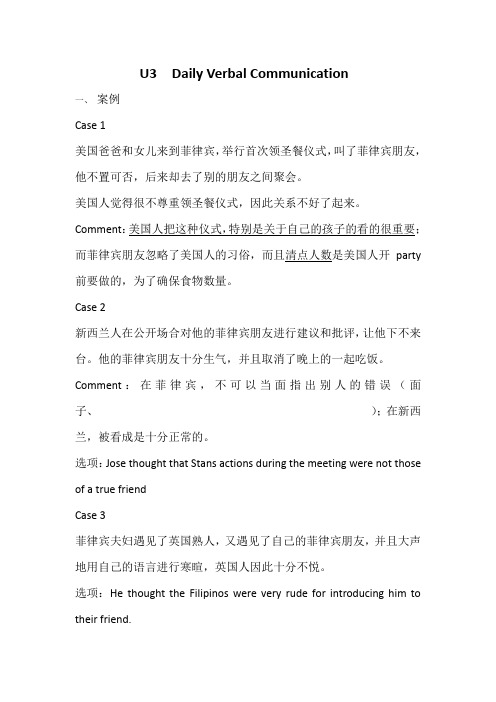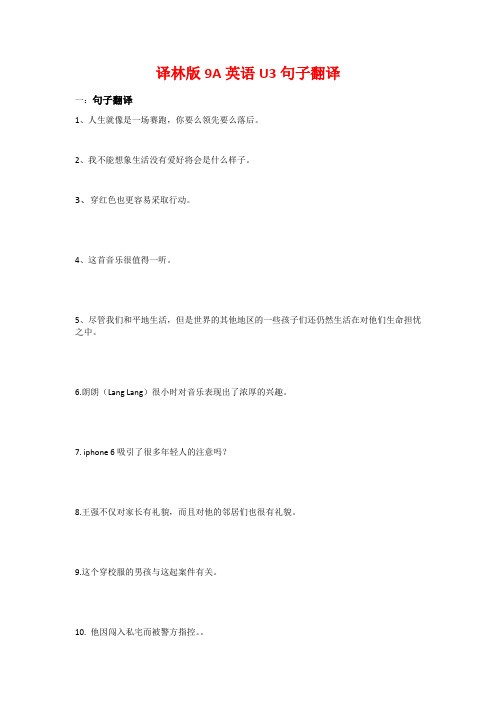english u3
- 格式:doc
- 大小:30.00 KB
- 文档页数:4

Unit 3 Topic 1 English is widely spoken throughout the world.一. 重点单词foreign —foreigner busy—business—businessman communicate—communication impossible—possible twin—twins lay—laid—laid speak—speaker Europe—European tour—tourist —tourism power--powerful lead—leading--leader二·词组。
stick sth on sp. 把。
贴在be ready for sth 为某事准备好了can’t wait to do sth 迫不及待做某事have a good chance to do sth 有一个好的机会去做某事throughout / all over the world 全世界from now on 从现在开始millions of 数以百万计的be pleased with 对。
感到满意pack one’s bags 打包行李on business 出差the night table 床头柜the official language 官方语言be similar to / be the same as / be different from和。
相似和。
一样和。
不一样have trouble/difficulty (in) doing sth 做某事有困难ask sb for help 向某人求助explain (sth) to sb 向某人解释某事get along with sb 与某人相处be in trouble 处于麻烦中divide into…把。
分成the largest number of people 最多数量的人mother tongue 母语the base language 基础语言international business 国际商业the world’s airlines 国际航空in many different fields of life 在生活的很多不同领域go abroad 出国play an important part in our lives 在我们生活中扮演重要角色a powerful country 一个强大的国家take the leading position in 在某方面处于领先地位encourage sb to do sth 鼓励某人做某事be popular with sb. 受某人的欢迎make great progress in doing sth 在某事上取得巨大的进步require sb to do sth 要求某人做某事in the rest of 在。

重点短语结构1. more outgoing 更外向2.as…as…与……一样……3.be similar to 与……相像的/类似的4.the same as 和……相同;与……一致5.be different from 与……不同6.care about 关心;介意7.be like a mirror 像一面镜子8.the most important 最重要的9.as long as 只要;既然10.bring out使显现;使表现出11.get better grades 取得更好的成绩12.reach for伸手取13.in fact 事实上;实际上14.make friends 交朋友15.the other其他的16.touch one’s heart感动某人17.be talented in music有音乐天赋18.be good at 擅长……19.be good with善于与……相处20.have fun doing sth.享受做某事的乐趣21.be good at doing sth 擅长做某事22.make sb. do sth.让某人做某事23.want to do sth.想要做某事24.as+adj./adv.的原级+as 与……一二.重点语法(一) 重点句型1. Both Sam and Tom can play the drums, but Sam plays them better than Tom. 萨姆和汤姆都会打鼓,但是萨姆比汤姆打得要好一些。
both (1) 表示“两者都”,both用在含有be动词的句中,应放在be动词的后面;用在含有行为动词的句中,应放在行为动词的前面(2) both…and…表示“两者都”,both...and在句中连接并列成分,如主语、谓语、表语、宾语等,位置比较灵活。
E.g. Both New York and London have traffic problems. (连接主语)The secretary both speaks and writes Spanish.(连接谓语)【考例】My parents ________ doctors. A. both are B. all are C. are all D. are both拓展:all表示“三者或三者以上全都”的意思,every指三个以上的人或物(含三个),each指两个以上的人或物(含两个)。

Unit 3 Our Colorful School Life
Lesson 3 Thinking Skills and Reading Strategies
I. Material analysis
Thinking Skills内容解读:本部分的思维技能内容为借助图表提取主旨大意和关键细节。
学生通过对图片、阅读文本和思维导图的学习,理解如何运用住址细节图表梳理文本的主旨大意和关细节信息;然后尝试在阅读新的文本时使用主旨细节图表归纳主旨大意和细节信息;最后学生根据所给单词提示,完成有关自己学校设施与环境的思维导图,并结合绘制的住址细节图表向同伴进行介绍,将思维技能应用到具体实践中。
本部分共3个活动。
Reading Strategies内容解读:本部分阅读策略的内容是学习快速浏览文本、获取所需信息,即扫读,共三个活动。
首先通过阅读问题,浏览英语俱乐部海报,定位并提取所需答案,再运用扫读策略,从海报中获取其它问题的答案,最后运用扫读策略,阅读文本和图片,获取答案,回答问题。
II. Teaching aims
1. 利用“略读”这一阅读策略,获取所需要的信息;
2. 借助主旨细节图表,从介绍学校设施的文本中提取主旨大义和细节信息;
3. 绘制所要谈论的学校设施的主旨细节图表,逻辑清晰地介绍学校的设施;
4. 主动观察、熟悉校园环境,积极参与校园活动。
III.Teaching procedures
IV. Blackboard design。

U3 Daily Verbal Communication一、案例Case 1美国爸爸和女儿来到菲律宾,举行首次领圣餐仪式,叫了菲律宾朋友,他不置可否,后来却去了别的朋友之间聚会。
美国人觉得很不尊重领圣餐仪式,因此关系不好了起来。
Comment:美国人把这种仪式,特别是关于自己的孩子的看的很重要;而菲律宾朋友忽略了美国人的习俗,而且清点人数是美国人开party 前要做的,为了确保食物数量。
Case 2新西兰人在公开场合对他的菲律宾朋友进行建议和批评,让他下不来台。
他的菲律宾朋友十分生气,并且取消了晚上的一起吃饭。
Comment:在菲律宾,不可以当面指出别人的错误(面子、);在新西兰,被看成是十分正常的。
选项:Jose thought that Stans actions during the meeting were not those of a true friendCase 3菲律宾夫妇遇见了英国熟人,又遇见了自己的菲律宾朋友,并且大声地用自己的语言进行寒暄,英国人因此十分不悦。
选项:He thought the Filipinos were very rude for introducing him to their friend.Case 4在澳大利亚“no etiquette”customno seeing out when guests leaves;no stand-up when leaders come in;no help for old people专题:Compliments and compliment responsesExamples:1.中国女士买了条裙子,美国女士说好看,中国女士说哎呀一般般;2.美国女主人向别人介绍中国学者,夸赞,中国学者却笑着说你不是真的这个意思?3.中国式谦虚反映了:1.the taste of the American lady is questionable,and poor judgement2.the hostess is not sincere3.“fishing for compliments”沽名钓誉,别人会接着夸你Social functions of complimentssituations: range from formal to casualIn formal situations—reinforce solidarity,connected with the appreciation of something that has been done to the speaker(尼克松访华:感谢中国人的好客和款待)In informal situations —achieve solidarity;make people feelcomfortable体现在:greeting people;expressing thanks ;getting over embarrassmentDifferences between Chinese and English compliments美国,女人不主动夸男人,但是男士应该通俗的对女士的打扮和衣着进行赞美但是在中国,如果男士夸奖女士,会被认为是调情,不尊重。

译林版9A英语U3句子翻译一:句子翻译1、人生就像是一场赛跑,你要么领先要么落后。
2、我不能想象生活没有爱好将会是什么样子。
3、穿红色也更容易采取行动。
4、这首音乐很值得一听。
5、尽管我们和平地生活,但是世界的其他地区的一些孩子们还仍然生活在对他们生命担忧之中。
6.朗朗(Lang Lang)很小时对音乐表现出了浓厚的兴趣。
7. iphone 6吸引了很多年轻人的注意吗?8.王强不仅对家长有礼貌,而且对他的邻居们也很有礼貌。
9.这个穿校服的男孩与这起案件有关。
10. 他因闯入私宅而被警方指控。
二:完成句子1. 艾米晚上习惯于开着灯睡觉,因为她怕黑。
2.他别无选择,只好放弃了出国深造。
3. 我想知道多久以后如此多的邮件会得以回复。
4. 汤姆对自己的学习非常严格要求,以致于关注课本中的任何细节。
5. 你能否向我解释一下,为什么我的电脑经常出故障?6. 你最好试着用你能想到的不同的方法来解决数学问题,因为这对学好数学很有帮助。
三:句子翻译。
1.熬夜看电视对我们的健康有害。
__________________________________2. Daniel需要与某个人分享他的烦恼。
__________________3.我们的父母总是太在乎我们的分数。
______________________4.雷声几乎使我发疯。
________________5.那个男孩别无选择,只得去睡觉了。
____________________四:句子翻译。
1.许多与我同龄的孩子都遭受着压力之苦.______________________________2.他这学期没有取得一点进步。
他的父母对他很不满意。
_________________________________3.把你的烦恼放在心里对健康不利。
___________________________4.在你的帮助下,那个女孩似乎比昨天高兴多了。
______________________________________5.考试前把整本书再温习一遍。

《Unit 3My Friends A Let’s Talk 》教学设计【学习内容】PEP Primary English Book 3 Unit3 My Friends A Let’s talk Let’s play 【教材分析】本部分学习的核心句型是:What’s his name? His name is…教材通过John向妈妈介绍自己的新朋友张鹏的情景,让学生感知上述句型的语义及其语用情景。
【学情分析】此话题较贴近生活,教师可以充分利用生活情景进行教学,并通过各种竞赛激发学生兴趣,让学生在愉快的学习氛围中习得语言,运用语言。
【学习目标】一、能力目标:能在情景中运用句子:What’s his name? His name is…并能与他人进行交流。
二、知识目标:1.能熟练朗读并模仿本节课对话。
2.能表演本节课对话。
3. 能在实际生活中运用本节课对话(创编对话,“任务型”教学)。
4. 了解知识点:his的正确用法。
三、情感目标:1. 让学生学会如何询问好朋友的名字以及描述好朋友的特征。
2. 在教学过程中鼓励学生大胆开口,提高学生综合运用语言的能力以及与人交往的能力。
【学习重、难点】学习重点:掌握句型:What’s his name? His name is…学习难点:如何在实际生活中灵活运用句型What’s his name?His name is…是本节课的难点。
【学习准备】多媒体课件、录音机、写有What’s his name? His name is…的句型卡片,分别代表男女组对抗的评价卡两张, 若干张评价粘贴。
【学习过程】一、Warming up/Revision(热身/复习)(此环节用时5分钟)说唱玩赛,激情引趣(一)评价分组中注意力热身学生分组,引入竞争:T:Today I’ll divide you into two groups. Look!Boy group and girl group. Let’s have a competition. Come on. Ok?Ss:OK!(二)3大PK复习旧知PK 1 ---Let’s sing.男女生分组演唱歌曲“Boy and Girl”,优胜组为小组加一分。
英语U2 、U3总结初一(1)班周明珍44 1U1报小结Give sb sthShe give us a lot of help with our studies.在学习上她给了我们很大的帮助。
Give sb sth意为“把某物给某人”,等同于give sth to sb,所以本句也可以说she gives a lot of help to us with our sthdies.【拓展】在短语give sb sth 中,sb 和sth 是动词give的双宾语,当直接宾语sth 为代词it或them时,只能说give it / them to sb。
如;please give it to Mr Black,而不能说please give Mr Black it.Do exercise“Do exercise every day. That is important!”he says. 他说:“每天锻炼身体很重要!”Do exercise意思是“锻炼身体”,还可以说take exercise。
这里的exercise 是不可数名词,是“锻炼、运动”的意思。
【拓展】exercise 还可以作可数名词,意思是”练习(体操、发音、保健等);训练;演习;习题“。
如:do English exercise s做英语练习;do morning / eye exercise s做早(眼保健)操go swimming / skiingI go swimming every day .我天天去游泳。
We go skiing in the snowy Mountains every winter in June or August. 每年冬天的六、七或八月我们都去雪山滑雪。
Go swimming ,意为“去游泳”,go skiing 意为“去滑雪”。
Go 作为动词,表示去行动;go+动词ing形式表示“去进行某项活动、运动,”尤其指体育运动。
7A U301课题:Welcome to the unit Class_______Name________ 【重点词句】1. 在开放日on the open day2. 谈论开放talk about the open day3. 家长会the parents’ meeting4. 观看我们的两节课watch two of our lessons4. 在校门口at the school gate5. 哪门科目是你最喜欢的?Which of the subject s do you like best?=Which subject do you like best?6. 今天几号?What’s the date today?=What date is it today?今天星期几?What day is it today?7. 几点了?What time is it?8. 让我们一点半在校门口会面。
Let’s meet at the school gate at 1:30.【知识梳理】1. which pron. 哪一个,哪些,是疑问代词哪个是你的自行车?________ your bike?茶和咖啡你比较喜欢哪种?________ _______ you like better, tea or coffee?这些书中你最喜欢哪本?do you like best? which adj. 哪一个,哪些, 后接名词你最喜欢哪个科目?_________ _______ is your favourite?哪一辆自行车是你的?_________ _______ is yours?思考:which(哪一个)与what(什么)的区别你最喜欢什么颜色?do you like best?红黄绿三种颜色你最喜欢哪种?do you like best, red, yellow or green? 结论:没有范围,泛指什么用,在一定范围内选择用。
各位老师,大家好!我今天说课的内容是九年级上Unit3 English around the world,T opic2 English is spoken differently in different countries. Section C我将从以下几个部分进行说课:Hi. I’m ShiHenglan I’m an English teacher from Xichuan No1 Middle School. Today I’ll say Section C of T opic 2 ,Unit 3 Grade 3. I ‘ll pre pare to say the lesson from six parts.一.教材分析1.【教材地位和作用】本课是仁爱版九年级第三单元第二个话题Section C的内容,本单元教学内容主要围绕English around the world.方面的话题展开.主要是介绍英语在不同国家表达的方式也不同。
认真完成本单元的教学内容,既是《英语课程标准》规定的基础教育阶段的主要任务之一,即帮助学生了解世界和中西文化的差异,拓展视野,培养爱国主义精神,形成健康的人生观,也是适应改革开放的要求。
从教材编排体系来看,先是交代英语在世界上被广泛地讲,然后是英语在不同的国家被不同地去讲,最后是我们应该怎样学好英语。
而我所讲的Topic2 SectionC正是本单元的中心部分,这节课对于整个单元内容的学习起到了巩固加深和承上启下的作用。
二.【教学目标】1.目标以课标要求为指导,教学大纲为依据,确定以下学习目标:【知识与技能】学习英式英语与美式英语在拼写、发音和表达方面存在的差异。
Discuss the differences between BritishEnglish and American English in spelling,pronunciation and expression.学习并掌握以下重点单词和短语Learn some new wordsand phrases:pronounce, pronunciation, fill in as for have difficulty doing sth be fond of fill in be close to not only… but also…in person【过程与方法】根据本课及学生的特点,采用导学互动教学方法,通过听、说、读、写,教会学生快速阅读的技巧,提高学生的阅读水平、获取信息和处理信息的能力,增强学生跨文化交际的意识【情感与态度】培养学生自学,合作,探究的精神和对语言多元化的接纳。
Innovation English Integrated Course Book 1Unit ThreeCelebrity —a Glory or Mess?ObjectivesStudents will be able to:1.Grasp the main idea (that being a celebrity is not an easy thing, which brings a glory as well as mess.) and structure of the text (introduction of the topic by personal experience; development of the article by citing research; conclusion of the article by restatement personal experience );2.Appreciate how the author achieves coherence of the essay;3.Acquire the key language points and grammatical structures in the text;4.Participate in a series of reading, listening, speaking and writing activities related to the theme of the unit.Suggested Teaching StepsLead-inText A➢Word Study➢Sentence Study➢StructureAfter-readingAdditional MaterialsLead-inDirections: Think of who might be your favorite celebrity and list your reasons.Your ideas and reasons:1)2)3)Directions: Who is the most famous person you know? Note down how the person became famous.●Text A: Being a Star Is Not That Easy (Explanation: Sentence 1)Fame is something I have a bit of personal experience with. As a journalist I’ve interviewed more celebrities than I can count, getting all kinds of insights into their live in the process. (Explanation: Sentence 2) But what I mean is that I have some experience with fame. Once, I was the star of my fifth-grade play, and the show was a huge success. And the next day at school, things felt sort of different. (Explanation: Sentence 3) People knew my name. The coolsixth-grade girls said hi to me during recess. I had unintentionally become famous. And it was great.In the years since, our culture’s obsession with celebrity (or, rather, with becoming a celebrity) has grown faster than a middle-aged man’s mustache. (Explanation: Sentence 4)“I would honestly love to be famous,” says fifteen-year-old Katie from Maryland. “I watch movies and shows every day wondering, when will it be my turn to do that?”According to a senior researcher at the Children’s Digital Media Center of a highly rated public university, “Our focus groups have shown that young people are aspiring to fame more than anything else.” (Explanation: Sentence 5) Twenty-year-old Michelle, from California, is one of the many. “I’ve always wanted to be famous, since I was a little girl,” she says. In a survey of 14-to-18-year-olds by The Washington Post, the Kaiser Family Foundation, and Harvard University, 31% of teens went beyond just wanting to be famous and admitted they think it’s likely they’ll be famous someday. Not only that, but a group of girls surveyed by someone said they’d much rather be a famous person’s assistant than be the CEO of a major company. (Explanation: Sentence 6)Someone may have put it best: “I live for the applause …” Yet living solely for others’ cheers is, as we know, a dangerous path. When your self-esteem depends on how much the world loves you, or views your vlog, you’re at its mercy. (Explanation: Sentence 7) And once the attention fades, you’ll be left feeling empty — or worse, if there’s no attention at all, you’ll feel like a complete failure. (Explanation: Sentence 8) Jean M. Twenge, Ph. D., coauthor of the Narcissism Epidemic, points out that dreaming of being on the covers of magazines simply isn’t beneficial to our mental health. “The desire to be famous is connected to unhappiness,” she says. “Research has shown that people who value money, fame, and image are more likely to be anxious and depressed.”So I’m just going to come out and say it: stop fantasizing about being a celebrity. The odds are way against you, and let’s face it: If you were a celebrity, you wouldn’t be able to go to a beach without the paparazzi taking pictures of you. (Explanation: Sentence 9) If you wanted to go outside without makeup you’d be ripped apart in the press, and if you made a totally human mistake you’d be practically put on trial.This brings me back to my fifth-grade experience with stardom. (Explanation: Sentence 10) A few days after the show, the fame began to backfire. Those sixth-grade girls who said hi to me? one of them started a rumor that I’d only gotten the part because of my mom. As my celebrity started to dwindle, and kids stopped inviting me to sit with them at lunch, I realized that I actually preferred being anonymous. Things were so much easier without all the extra attention. So, yes, fame is pretty alluring —the fancy dresses, the VIP treatment, the money. But for now I’ll take my regular life and its surely happier ending. You should, too.Word StudyWord Study: Interviewinterview vt.1) to ask sb. questions about their life, opinions, etc., especially on the radio or television or for a newspaper or magazine 采访e.g. The Prime Minister declined to be interviewed.总理谢绝采访。
Unit3 Walter Anderson :hero on parade Walter Anderson joined the ranks of the Horatio Alger Society the same year I did. I felt a special kinship to him as I heard his story---for reasons that will be obvious as I relate it here.Walter grew up in a four-room railroad flat on the wrong side of the tracks in Mt. Vernon, New York, in an atmosphere made volatile and violent by an illiterate, abusive, alcoholic father. “I lived with fear every day, nearly every minute of my childhood,’’Walter remembers. “Often my father would beat me for things I might do, not for things I had done.I felt safer on the street corner than in my own home.”Like me, my friend Walter credits his mother and reading as key influences in his life, His mom always tried to shield him from his father’s ab use. “I never doubted my mother’s love.”Walter says. “She encouraged me to read despite the fact that my father would beat me if he found me reading. Years later, after my father’s death, I asked her why she would do so when she knew father would beat me, and she said, “I believed that if you could learn to read, somehow you would found your way out and you did”.The Mt. Vernon Public Library became a secret sanctuary where Walter regularly escaped the abuse of his father and the cruel ridicule of classmates who laughed at the holes in his ragged clothes. “I read myself out of poverty,”he says. “By reading I coul d go everywhere, I could beeverybody .I could imagine myself out of a slum.”Six days after his seventeenth birthday, he found another way out. He joined the Marines. That decision altered his perspective, his values, and his life forever. “I was able to develop self-respect, self-esteem, and a belief in noble motives and noble purposes. I learned about honor and dignity.” In 1965, just months before he was to complete his active duty, Walter volunteered for Vietnam.When he return home from overseas and was discharged, Walter first took a job as a laboratory assistant, then as a sales trainee. But what he really wanted to do more t han anything else was to write. “Ever since I was fourteen or fifteen years old, I had a tremendous need to empress myself.”Carrying the only thing he had ever had published, an emotional and articulate “letter to the editor” he had written from the front lines in Vietnam, Walter walked into a newspaper office to plead with the editor for a job. After reading Walter’s one-clipping portfolio, the editor of the Reporter Dispatch in White Plain, New York, hired him for $90 a week.While working as a reporter in White Plain, Walter enrolled in a local community college and graduated two years later---first in his class of six hundred students. By that time he was “night editor” of his paper and had started his own action-line column, which was syndicated in seven other newspaper Nearby Mercy College awarded him a fullscholarship to continue his education. He graduated from there summa cum laude, once again class valedictorian.After serving as editor and general manager of two daily newspapers, first in New Rochelle and then back in White Plains where he began his career, he moved to Parade magazine. He served as managing editor there before being promoted to editor of the largest-circulation Sunday magazine in the world at the age of thirty-five.From the time he took over the editorial reins of Parade in 1980, until he was inducted into the Alger Society with me, circulation of his magazine had risen from 21 million copies in 129 Sunday newspapers to more than 37 million copies in 353 papers.In the course of his journalistic success, Walter met and interviewed a lot of famous people from whom he learned some valuable lessons. “I thought for the longest time that I was the only human being who worried that others would find out that I was inferior, that I was vulnerable, that I deserved to be rejected. I now know that all sane human beings worry that others will find out that they are not quite good enough, that they can be hurt, that maybe they don’t belong.”So, from his own life and from what he had learned from talking to some of the successful people in our society, Walter has compiled his “seven rules to live by.” I think they make a pretty good prescription for curing the victim mentality.Here are Walt er’s seven rules:1.Know who is responsible:“I am responsible.” when youbegin these three words, you can build a new life, even anew world.2.Believe in something big:When we commit to high ideals,we succeed before the outcome is known. Your life is wortha noble motive.3.Practice tolerance:You’ll like yourself a lot more and sowell others.4.Be brave:Remember, courage is acting with fear, notwithout it. If the cha llenge is important to you, you’resupposed to be nervous; we worry only about things we careabout.5.Love someone: Because you should know joy.6.Be ambitious:No single effort will solve all of yourproblems, achieve of your dreams, or even be enough---andthat’s okay. To want to be more than we are real and normaland healthy.7.Smile: Because no one else can do this for you.。